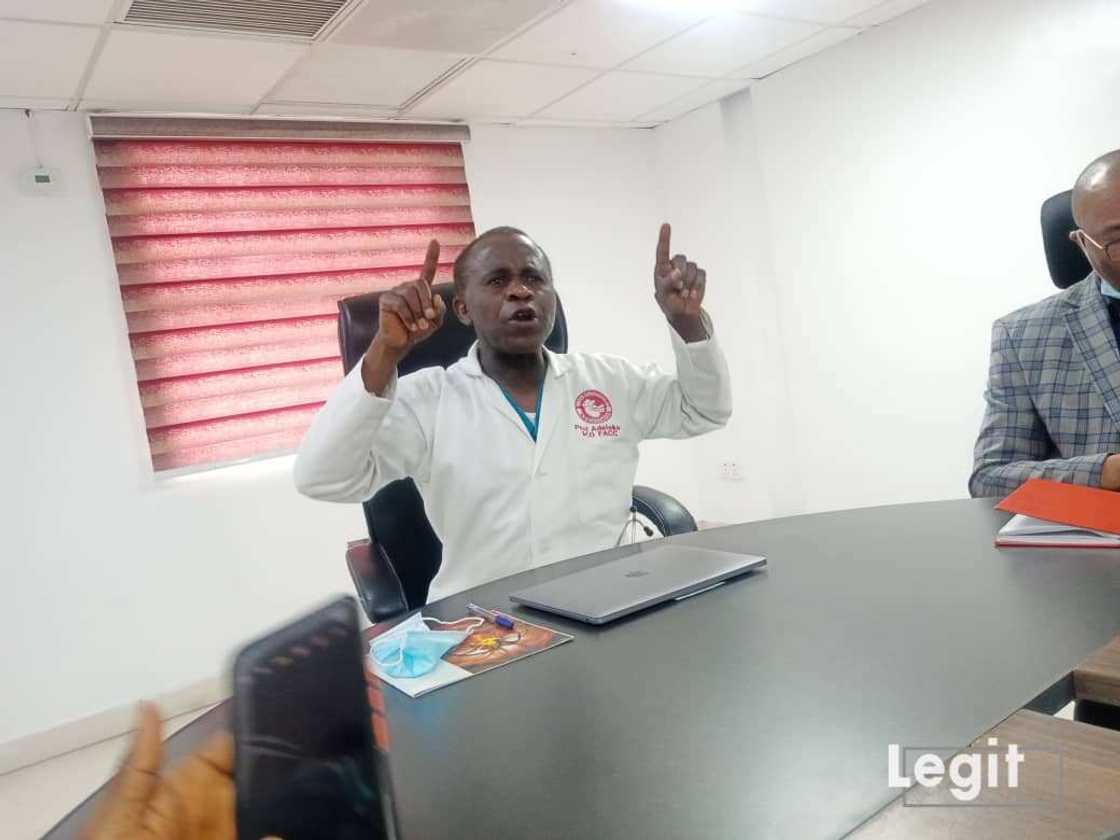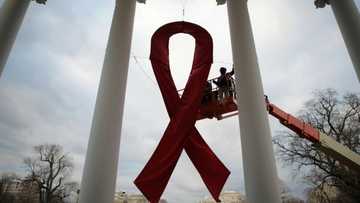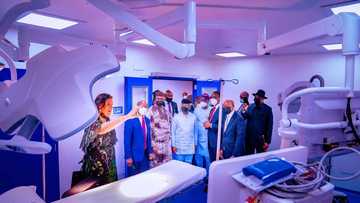Our Goal Is To Have First Heart Transplant in Nigeria, Tristate Boss Adeleke Reveals
The president and chief executive officer of the Tristate health care system, Prof. Kamar Adeleke, has explained that Nigeria has what it takes to cater for the health of her citizenry.
Legit.ng reports that Adeleke, a US-trained interventional cardiologist, made this known on Friday, July 22, during a media interaction in Lagos.

Source: Original
He said he came to Nigeria after spending over 40 years in the US to make the cardiac programme affordable and accessible to the people, saying that he is keen on making the first heart transplant in Nigeria.
Why average life expectancy of Nigerians was 46 in 2012
The medical guru said that he became troubled in 2012 when he made a medical mission to Nigeria and realised that the average life expectancy was put at 46 years at the time.
PAY ATTENTION: Follow us on Instagram - get the most important news directly in your favourite app!
He said:
"I trained and lived in the US for over 40 years, and in 2012, I did a medical mission to Nigeria where we saw over 5000 patients in two weeks and during that time, I knew that Nigeria was in trouble. This was because an average life expectancy put at 46 years at the time. So that was not good.
"Cuba was about 80, while the US was 79, at the time. So that is part of what brought me back to Nigeria to come and help my people, because we found out that the number one cause of death in Nigeria is no longer communicable disease but non-communicable, with heart diseases taking a bunch of this."
Adeleke lamented that at that time, there were only two cardiologists that could really do the job in the whole of Nigeria - Yemi Johnson and one other person, with a population at the time of about 175 million people.

Read also
Ghanaian-American comedian Michael Blackson is building a school in his hometown Nsaba, Ghana
He added:
"What can the two of them do? In the US where I practised, I have helped in saving many lives from heart diseases, so why can’t I do the same in my own country? That is why I came back home. So, I decided to replicate our Tristate Cardiac Centre in Pennsylvania, Delaware, and New Jersey here in Nigeria.
Speaking further, he noted that the cardiac mission in Nigeria started at the University College Hospital (UCH), Ibadan in Oyo state, where over 40 open heart surgeries were done.
Prof. Adeleke also noted that the mission was later moved to Babcock University where he started a cardiac programme which cost huge amount of money.
He stated:
"We started at University College Hospital (UCH), Ibadan where we did over 40 open heart surgeries. We moved to Babcock University where we started a cardiac programme. That was three years ago.
"Today, Babcock is practically doing open heart surgeries every day. We have now done over 400 cases at Babcock. Then, we opened another hospital in Ibadan and we are partnering Reddington Hospital.
The success rate on heart operations
Adeleke added that the success rate of Tristate on diagnosis is 100%, saying that on open heart surgeries, for paediatrics, "we have 100%; for the high risk or for the elderly, we have about 60%. In Nigeria, Tristate is like a dumping ground for the high risk because people believe such conditions can only be tackled in our clinics."
How Nigerians will benefit from cardiac programmes
The interventional cardiologist noted that the cardiac programme would cut down on cost and medical tourism among Nigerians.
According to him, Nigerians do not need to travel abroad for heart surgeries when the operation can be done right in the country successfully, noting that it would improve the country’s financial strength.

Read also
Gender inclusion: Stakeholders brainstorm as foundation kicks-off what women can do competition
Adeleke reiterated:
"The programme will cut down on cost and medical tourism. Nigerians do not need to travel abroad for heart surgeries when it can be done right here successfully. It will improve the country’s financial strength. Healthcare in the US contributes 16 to 20% of the total GDP, that’s about 19 trillion dollars.
"Healthcare is a big business; employments will be made, there will be pharmacies, we will be manufacturing, there will be equipment company, among others. All these will improve the economy of the country. To achieve this, we are getting a lot of support, and Aliko Dangote Foundation is one of those supporting us.
How indigent Nigerians will benefit from open heart surgeries
He maintained that the main goal of the programme is to support the downtrodden/less privileged who need urgent attention to survive cardiac arrest and other heart-related diseases.
The cardiac expert said:
"Our goal is to help people. There are times we contributed N1 million, N200, 000, and so on. We have done about five like that in the past one month. Our goal is to make sure people do not have to lose their lives because they are unable to pay for surgeries.

Read also
"I want to meet with Davido": Man rides bicycle from Ogun to Ede, says it's for Ademola Adeleke's victory
"That is why we are partnering with government at all levels and private sectors so that people who can’t afford treatment will have the treatments they require for a healthy heart.
"The mentality that people must travel out for treatment has to change. Whites are not better than us. If you go anywhere in the world, you would see Nigerians are very brilliant people."
He also noted that if the federal government gives healthcare priority and ensures every Nigerian has access to quality and affordable healthcare, no one will need to travel for treatment.
According to him, what the government needs is to strengthen healthcare and bring Nigerian healthcare professionals in the diaspora back home.
He added that the professionals from abroad would complement what Nigerians here are doing, saying that Nigerians are some of the most brilliant people in the world.
Adeleke further stated:
"I have never seen any more brilliant doctors than Nigerians. Government should create enough business environments so that even those abroad can come home. A lot of countries envy our brilliance, resilience, population and resources. There is no reason any Nigerian should be poor or not have access to quality healthcare.
Why people need to prevent heart problems
He advised that prevention and healthcare generally start from the preconception of a baby, adding that before the woman gets pregnant, she should be healthy, including avoiding environmental hazards.
The expert noted that pregnant women should have very good routine care because the site of the placenta is directly correlated to the growth of the baby, saying that studies have shown that women with poor nutrition pass poor health down to their babies.
He advised:
"Once the baby is born, make sure the child doesn’t have a heart murmur, those with anaemia should be treated, and those with defects should be corrected. People go to hospitals only when they are sick.

Read also
"I've been supporting Atiku since 2019": Cross talks about politics, accidentally sharing unclad photo
"Preventive checks are very necessary. From ages 0 to 12 years, we should do necessary immunisation. As an adult, certain risk factors have to be modified, including alcohol intake, and smoking.
Nigerians commend VP Osinbajo as he undergoes surgery in Lagos hospital
Meanwhile, Legit.ng had previously reported that Vice President Yemi Osinbajo, was admitted at Duchess Hospital, Ikeja, Lagos for a surgical procedure over pain in his leg.
It was reported that Laolu Akande, spokesman to the vice-president, disclosed in a tweet on Saturday, July 16.
According to Akande, Osinbajo’s surgery is due to recurrent leg pain in the leg possibly sustained from an injury while playing squash.
Source: Legit.ng





